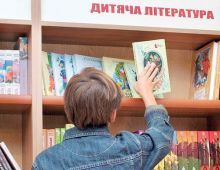“Skhidna Brama” bookstore opened in Luhansk to the 199th anniversary of Taras Shevchenko’s birth. This was the initiative of the former leader of Luhansk “Svoboda” Party Dmytro Sniehiriov.
The bookstore will have a large assortment: books (from dictionaries to fiction), audio products (CDs of Ukrainian music and Ukrainian audiobooks), clothes with national symbols, and souvenirs. The suppliers of book products to Luhansk bookstore will be the publishing house “Folio,” chain of bookstores “Ye,” and “Nash Format” Agency (direct agreement has been signed already). Soon books from The Day’s Library series will be available there too.
The Day’s editor-in-chief Larysa Ivshyna shared good news on her Facebook page and also added that books from The Day’s Library series, that have long found their place on the shelves of bookstores in Kyiv, Lviv, and other Ukrainian cities, will soon be available at the Luhansk bookstore. These books also present some kind of coordinates of cultural intersections. They have been actively discussed at universities, including the meetings of the Discussion Club in Ivan Franko Lviv National University and the National University Ostroh Academy. Now they will appear in Luhansk and such discussions can be held on a wider scale with new points of view.
The post made by Larysa Ivshyna on Facebook caused a lively discussion. Taras Prokopyshyn, one of the organizers of the “street university” in Lviv (read more on this in the article “Supermarkets of Knowledge” published in The Day issues No.70 from November 15, 2012), suggested The Day to become a book partner for youth educational initiatives. Again the intellectual theories have crossed.
“In my understanding an ‘intellectual theory’ is a kind of ‘the third place’ that was studied by American sociologist Ray Oldenburg. Unlike the first place (home) and the second place (work), the third place is a place of informal communication, self development, and simply a place for having nice time with friends and like-minded people. Such ‘intellectual spots’ are great places for the creation of new ideas and implementing creative projects. Cafes, art institutions, libraries, bookstores, and various clubs can become such spots. Interdisciplinarity is the thing of the future, that’s why I am certain that one way or another events and projects of ‘intellectual spots’ will increasingly coincide. Thus, together with friends we create educational ‘third places’ – ‘Street University’ and ‘Educational Lab,’” Taras Prokopyshyn told The Day. In his opinion, the opening of a Ukrainian bookstore in Luhansk is “a good example of social demand for ‘intellectual spots.’” “I am glad that patriotic ‘third places’ are being formed in the east too. I am sure that such informal format is a key to historical (and not only) understanding between people,” concluded Prokopyshyn.
Sniehiriov assured that he has already had experience in spreading Ukrainian books. Several years ago he tried to open three libraries in the region: in Rovenky, Severodonetsk, and in Luhansk. “However, this campaign ended very sadly: libraries outside Luhansk were almost immediately plundered. And this experience inspired us to open a bookstore,” said the organizer.
“Skhidna Brama” is more than just a store. According to the organizer’s plan, the bookstore has to become a cultural center for Luhansk residents who speak Ukrainian. There will be a book-crossing spot and a video room. Besides, the organizer plans to host exhibitions of folk craftsmen from Luhansk region and meetings with Ukrainian writers. The organizer of the bookstore told at the opening that soon Stanislav Fedorchuk, author of the book Hypocrisy Dismantling, and poetess Tetiana Kovalenko will be the guests of “Skhidna Brama.”
“The place should operate not only as a bookstore, it should also fulfill a certain educational mission, present direct communication of readers with book authors. It is a common European experience. We only introduce it in Luhansk region,” said Sniehiriov.
The enthusiast from Luhansk hopes for the state support. “Opening of a Russian bookstore [there are two of such stores in Luhansk. – Author] has been financed from abroad, straight by the government of the Russian Federation because for them Russia ends where the Russian word ends. It would be great if our government could adopt this principle too,” said Sniehiriov.







